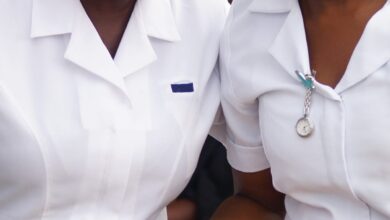UITH COVID SAGA: My role in management of suspected Kwara COVID-19 case – Suspended Professor
The suspended professor of medicine at the University of Ilorin Teaching Hospital (UITH) has denied allegations of concealing vital information about the first suspected case of COVID-19 in Kwara State. He also denied the charge of unethical behaviour.
The embattled professor of Infectious and non-infectious pulmonary diseases, Alakija Salami, was accused of misleading his colleagues to treat the suspected case, Muhideen Obanimomo, who died at the hospital on April 1. The late Mr Obanimomo was a relative of the senior medical doctor, Mr Salami.
The federal facility said the deceased had been on self-isolation on arrival to Ilorin prior to his presentation at the Accident and Emergency unit of the hospital “on the advice of the Professor who brought him.”
It said the information of self isolation “was concealed from the front line medical personnel at first contact in the A&E, an act that the hospital management considered unethical.”
The death of Mr Obanimomo, a 57-year-old UK returnee, generated controversies among Kwara residents, particularly in Offa, where he hailed from and where his remains were buried.
Although the state government earlier denied that his was a COVID-19 related case, the result of samples later taken showed that his wife was positive for coronavirus.
A statement by David Odaibo, UITH’s director of administration, said the management suspended Mr Salami over his conduct in the management of a COVID-19 patient.
“The Management of University of Ilorin Teaching Hospital hereby suspends Prof A.K. Salami as a Senior Consultant in the hospital,” he said.
In addition, the Chief Medical Director of the facility, A.D. Yusuff, said the management had constituted a Medical Investigation Committee to investigate the process of admission, management and eventual release of the corpse of Mr Obanimomo.
“Also it will investigate the motives behind the concealment of accurate information provided by the patient’s relative, determine culpability of the patient’s relative involved and make appropriate recommendations to forestall future recurrence of the act.
“This Committee is to submit their report within a week from the date of their first sitting,” the official stated.
Salami’s reaction
However, in a comprehensive letter he submitted to the committee, titled; ” My role in the management of Alhaji Muideen Obanimomo”, Mr Salami gave his side of the story.
According to the senior medical doctor, “many commentaries, rumours and speculations have been made about what happened and conclusions were reached that I brought a suspected COVID-19 patient to the hospital without due disclosures, thereby endangering the lives of my colleagues and health workers within the system.
“I am still at a loss as to what empirical facts or clinical evidence were available and relied on to reach such conclusions. From the available medical facts, my interactions and observation of the patient, there is nothing to justify that I brought a suspected COVID-19 patient to the hospital on 1st April, 2020.”
“By my training as a medical practitioner, I do know that, medical conclusions are reached based on empirical clinical symptoms and signs as well as clinical investigations and not on speculations or rumours.”
“Sir, to the best of my knowledge, the deceased- my cousin returned to the country from the UK but did not manifest any symptoms or signs of COVID-19 as at the time I took him to UITH for medical care and I don’t know of any of our policy that forbids that,” Mr Salami said.
How it happened
He stated that, at about 7:30 p.m. on April 1, the patient who was his cousin, called to inform him that he was not feeling fine.
“His complaint was that he was having abdominal discomfort and that he had had three episodes of loose stool in the last five (5) hours. According to him, this started barely 30-45minutes after eating an overripe pineapple. I asked him whether he had associated fever and vomiting to which he said there was none.”
“I then asked him to take plenty of fluid and relax. He called later at about 8pm to inform me that he had had additional two loose bowel motions that were in large quantities and had started to feel dizzy and that his feet were heavy.”
“Acting with caution, I went to his house with my face mask, gloves and thermometer. On getting there, I met him and asked him what happened and he repeated the same story which he had told me over the phone. I asked him what other complaints he had, he said none. This time I asked him whether he had difficulty with breathing or cough or sore throat, to which he answered no. I then ascertained his temperature with the thermometer which came out to be 37OC.”
Mr Salami said his assessment of late Mr Obanimomo led him to the conclusion that he needed to be taken to a medical facility, hence his decision that he should be taken to the UITH.
He said from the time he had physical contact with the patient up till when they got to UITH, he was still looking out for any slightest signs of coughing or sneezing to raise any concern of symptoms of COVID-19 but there was none.
Mr Salami said he informed his colleagues that the patient was his cousin who returned from the United Kingdom 13 days earlier and that he had been in self-isolation.
“I instructed them to stay at a distance to take his history. The disclosure of his travel history was documented in his case note and this can be verified from the attending doctors.”
“Thereafter, the first thing that was done on him was to check his body temperature with a temperature gun. This came out to be normal. From a distance, the doctors asked him for history of cough, sore throat or breathlessness or body aches all of which he said were non-existent. Dr. Azeez and Dr. Wasagu; the Senior Registrars that took his history can confirm that I never moved away or kept a distance from him and that I did not suppress any information as to his travel history,” he narrated.
“The patient gave all the history by himself to the attending doctors while I filled in the gaps with what I knew about his medical history, particularly that he was hypertensive and on Lisinopril, prazosin combined with hydrochlorothiazide.”
“However, his condition suddenly changed for the worse while being examined. He suddenly became drowsy, restless and tremulous on the right fingers. He started opening and closing his eyes repeatedly and was becoming stiff on his left limbs.”
“Few minutes later he vomited, possibly aspirated and had cardiac arrest and I spontaneously started Cardio-pulmonary resuscitation (CPR) on him, and I was joined by the medical team on gloves and face masks. The nurse that assisted us also had face mask, gloves and gown on.
“He was certified dead at about 1½ (one and half) hours later at about 10:50pm. He was packed and deposited in the UITH morgue around twelve (12) midnight.”
Speaking on the burial of Mr Obanimomo, he said, the deceased family decided to bury him at Offa – his home town in accordance with Islamic injunction.
” And we (the family) agreed to move his corpse in the morning to Offa for burial. I came to the UITH the following morning of 2nd April 2020, and I met the nurse in the A&E who said that I was to pay the sum of N3,300 only for the mortuary to release the corpse. She said the porter who was to follow me with the deceased folder had gone to collect the face masks and gloves for A&E, I told her that I can as well go and pay and she released the folder to me. I paid the said amount at the hospital central pay point and receipts evidencing payment were kept in the deceased folder.”
He said it was his confused frame of mind arising from the sudden demise of my cousin that “threw him overboard” in not immediately returning the folder to the hospital’s registry.
The suspended professor insisted that he called the COVID-19 technical team in the state when the suspicion first arose that it could be a COVID-19 case.
“As we were about to exit Ilorin, the Deputy Director of Nursing Services (DDNS) called me by a proxy phone line and asked: “where are you?” I told her and she said that “hope it was not a COVID-19 patient that I brought to A&E”. I replied her that there was nothing to suggest it, except that he had a history of return from UK travels.”
“Immediately after the DDNS’s call, I informed my CMD (at exactly 8:52am) that I would be getting across to the Kwara State COVID-19 Technical Team and he agreed with me. Then I called their number-08064369063 (at exactly 9:02am) and one Dr. Mrs. Kamaldeen picked my call. I identified myself and told her what had happened. I also told her that we were taking the corpse to Offa, and that we were about leaving Ilorin. In response the woman said OK.”
“She added that she was going to get back to me. She requested that I should endeavour to send the phone line and home address of the wife of the deceased in Offa. I immediately complied with her request. About thirty (30) minutes after, another member of the technical team called me. He told me that he had heard what happened and also said that I should send the phone line and address of the wife in Offa to him; and I did.”
He said that the calls he referenced as well as the contents of the conversations can be verified from the telecommunications service providers.
In the concluding part of the letter, Mr Salami denied the charge of unethical behaviour and emphasised that he acted throughout the incident in good faith.





